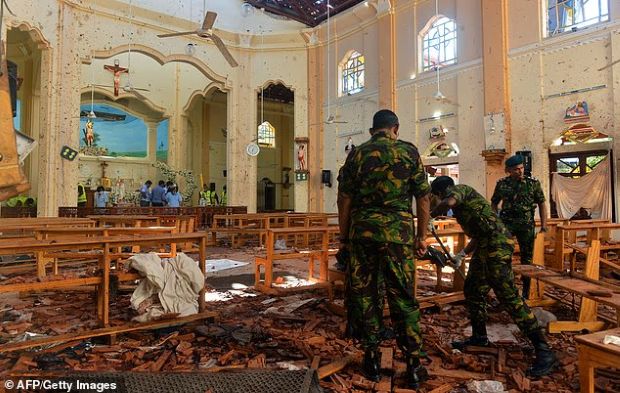Easter Sunday bombing suspect seeks asylum in Britain
By Robert Folker and Jon Brady
LONDON – A suspected Islamist terrorist questioned over the savage 2019 Easter Sunday bombings in Sri Lanka is seeking asylum in the UK.
The asylum seeker, from Sri Lanka, was detained in his home country over allegations that he was involved in the Easter Sunday bombings in April 2019, which killed 269 people. Hundreds were also left injured.
An Islamist terror group with links to ISIS was thought to be behind the attacks at a series of churches, luxury hotels and homes, all carried out by suicide bombers.
A news agency acting as an ISIS mouthpiece later claimed that the perpetrators were ‘Islamic State fighters’.
The migrant, who has been granted an anonymity order, was arrested by Sri Lankan authorities in January 2022, under suspicion that he had been involved in the attack.
Months later, he fled his home country and arrived in Britain, where he soon sought asylum for both himself and his wife on the basis that he would be ‘persecuted’ if he returned home.
Two weeks after he arrived in Britain, Sri Lankan authorities issued a warrant for his arrest.
Home Office officials refused his asylum claim in April 2024, and an initial appeal against the decision was refused by a first-tier immigration tribunal judge in March this year.
But the terror suspect has since been granted a further chance to claim asylum in Britain after claiming that the earlier judge had been ‘biased’.
What happened in the 2019 Sri Lanka Easter Sunday bombings?
Bombs were detonated in rapid succession at three churches in Colombo on Easter Sunday, one of the holiest days in Christianity.
Explosions also rocked three luxury hotels, targeting foreigners who were sitting down to breakfast.
The most deadly blasts were at the two Roman Catholic churches, the Shrine of St Anthony and St Sebastian’s, where 171 worshippers were killed.
Three five-star hotels on the beachfront were attacked around the same time: the Shangri-La Hotel, the Cinnamon Grand Hotel and The Kingsbury.
The attacks killed more than
260 people, including eight British tourists and three children of the Danish billionaire owner of ASOS, Anders Holch Povlsen.
At least 45 children, including nine foreigners, were killed in the atrocity.
The attacks were blamed on two local Islamic extremist groups that had pledged allegiance to Islamic State.
It is believed that the eight suicide bombers were associated with an Islamist militant group named National Thowheeth Jama’ath (NTJ), which has suspected foreign ties – including with Islamic State.
Among the dead were Anita Nicholson, 42, and her son Alex, 14, and daughter Annabel, 11, who were originally from London but were living in Singapore at the time of the attack.
They were killed instantly by a bomb as they sat down for breakfast at the Shangri-La Hotel in Colombo.
Three other Brits – Lorraine Campbell, Bill Harrop and Sally Bradley – were killed in an attack at the Cinnamon Grand Hotel elsewhere in the capital; siblings Daniel and Amelie Linsey also died in the attack.
The upper-tier tribunal hearing was told that the man was only released from police detention in exchange for a ‘substantial bribe’ – and that his family in Sri Lanka was visited by police.
The Sri Lankan claimed the earlier judge had been ‘biased’, failed to spot similarities between a Wikipedia page on the bombings and police report, and had not explained why evidence from a Sri Lankan lawyer was rejected.
He also questioned why the judge had not considered why an arrest warrant had been issued despite the fact that he had been released on bail.
He represented himself during the tribunal, held in Birmingham, speaking both in English and through a Sinhalese interpreter.
Deputy Upper Tribunal Judge Claire Burns found that the previous hearing had made a series of errors, including them missing that he had been released on bail following an arrest warrant.
The first judge failed to consider the ‘fundamental’ evidence submitted by the Sri Lankan lawyer, and erred in law by making findings on the arrest warrant that were ‘contradictory’ to the evidence before him, she added.
Judge Burns did not, however, agree with the terror suspect’s claims that the first judge was ‘highly prejudiced’.
She said: ‘I find that there is no merit in this ground whatsoever.’
The facts of the case will be heard at the first-tier tribunal at a later date.
Judge Burns concluded: ‘The Judge erred in law in his analysis of the documentary evidence as set out above, and so for that reason the decision must be set aside.
‘I determine that no facts should be preserved. This will enable the new Tribunal to make a full assessment of the credibility of (YA’s) account on full consideration of the oral and documentary evidence.’
-dailymail.co.uk



Comments are closed, but trackbacks and pingbacks are open.